#am not here to debate theology
Explore tagged Tumblr posts
Note
Did you grow up Lutheran, or did something about the Lutheran church draw you in?
Both! I grew up ELCA then AFLC so it was kind of a weird hodge podge of Lutheranism combined with evangelicalism.
As a kid in the ELCA, we had strict Lutheran liturgy (confessions, creeds, call and response, etc) but simultaneously very progressive theology
Then we went to the AFLC which varies so much church by church, but basically it was very evangelical type church except we still baptize babies for some reason. So a lot of the core tenets of Lutheranism were kinda fallen from and I didn’t understand them or like them. And I couldn’t understand why I was expected to believe the answers in the catechism when the general attitude of the entire congregation was that communion wasn’t more than memorialism etc. it left me in an intellectual rut cuz I could see a clear hypocrisy. People Lutheran in name only but not giving their own self professed beliefs the reverence they deserved. I think this played a great deal into my teenage agnosticism — people clearly didn’t believe what they said I should believe.
Then when I became Christian at 18, it was baptist ministers who reached me tbh. So I had done away with Lutheranism entirely. And for whatever faults Baptist theology has, I have to hand it to them that they are better evangelists than anybody, and that they do have a very sincere love for the Bible.
As it goes, diving so deep in the Word is exactly what made me no longer able to hold to baptist theology, however lol. I found myself in a state of cognitive dissonance. And I eventually came across pastors like hans fiene who slowly chipped away at my theology. And it was a Bryan Wolfmueller video that finally made things start clicking in my brain. And beyond that, Lutheran sermons are so much more edifying than baptist sermons. Lutherans have a better law/gospel distinction than anybody. Starting to listen to truth Lutheran sermons absolutely changed my world. I had never heard these distinctions made so clearly. And Lutheranism is the most straight forward way of reading the Bible. Which is why people who come from stronger theological systems have a distaste for it. Because where things don’t make sense to us theologically, we’re content saying “it’s a mystery.” It’s a phrase that comes up often when discussing Lutheran theology.
I also found myself missing the liturgy. For however off track I got as a teen, I never fell into false trinitarian beliefs or anything like that and I 100% attribute that to saying the creeds every Sunday as a kid. The liturgy exists for a reason. It has its place. And it is good.
Not to mention that the more you study history, it’s pretty much impossible to deny some form of baptismal regeneration and real presence and honor towards tradition (not in the Catholic sense obviously) These are all historical Protestant beliefs.
#am not here to debate theology#pretty much what I’ve said here is just facts#I’m not making the case for exactly how to understand real presence or if you should be Lutheran or Presbyterian#just saying truths lol#fight somewhere else
7 notes
·
View notes
Text
The Bible Calvinism
Look, we joke a lot, but really, "you were born evil, wretched, worse than the scum of the earth, and it took killing a god to make you salvageable, so now you'd better be grateful to that god and thank him 10,000 times a day for it and fill your thoughts with him 24/7 and abide by the letter of his every word, lest you suffer unimaginable torture for all of eternity" is a truly horrendous thing to believe about yourself and other people
#just to put my religious studies major hat on here but#this is not “the story of the bible”#jews don't believe this#for starters#and it is debatable whether early Christians even had a concept of eternal hell (I am in favor of the arguments that they did not)#the best summary of this idea “sinners in the hands of an angry god” was written by a calvinist#which has been a formative theology in the anglosphere#but it isn't “the story of the bible”
60K notes
·
View notes
Text
Martin Luther’s 95 Theses
On October 31st, 1517, Martin Luther published his “Disputation on the Power and Efficacy of Indulgences” (the 95 Theses). There is debate on whether he actually nailed them to the church door, and whether that occurred on the 31st if it happened at all. Posting an academic disputation on church doors was customary - and in fact at the time was required by the university in Wittenberg. The 95 Theses were written in Latin and sent to various people who Luther wanted included in the discussion, such as the Archbishop of Mainz, Albert of Brandenburg.
Luther’s nailing of the 95 Theses, if it happened at all, was not an act of protest. It was a standard protocol for a university professor who wanted a debate. It is the reaction of the Pope that turned an academic debate into what is now referred to as “The Protestant Reformation.”
The preface to the 95 Theses reads as follows:
“Out of love for the truth and from desire to elucidate it, the Reverend Father Martin Luther, Master of Arts and Sacred Theology, and ordinary lecturer therein at Wittenberg, intends to defend the following statements and to dispute on them in that place. Therefore he asks that those who cannot be present and dispute with him orally shall do so in their absence by letter. In the name of our Lord Jesus Christ, Amen.”
Click here for the full list
In 1521, Luther was called before the Diet of Worms and asked to recant all of his works (25 books). He responded that he could not, because much of what was in his works was in line with the Vatican and basic Christian doctrine. He said that if anyone could show his errors by Scripture, he would recant. He said:
“Unless I am convinced by the testimony of the Scriptures or by clear reason (for I do not trust either in the pope or in councils alone, since it is well known that they have often erred and contradicted themselves), I am bound by the Scriptures I have quoted and my conscience is captive to the Word of God. I cannot and will not recant anything, since it is neither safe nor right to go against conscience. Here I stand, I cannot do otherwise. May God help me. Amen.”
The term “Protestant Reformation” is an oxymoron. The Lutheran Reformation was never intended to be a protest or an effort to “make a new church”. It was always a call for reform and a return to the clear teachings of Scripture within the Church. Protestantism, by contrast, is marked by an intentional effort to break way from the Roman Catholic Church - rejecting many of the good teachings and practices of the Rome along with the bad.
65 notes
·
View notes
Note
Does Arceus have greater than human intelligence?
I am not here to debate theology.
#harmonia answers#Anonymous#rotumblr#rotomblr#pkmn irl#pokemon irl#pokeblogging#irl pkmn#irl pokemon
15 notes
·
View notes
Text
Welcome, sibling! 🙏🏻❤️
My name is E, I use they/it/he/she pronouns, and I am 25 years old! I'm a current art history major at university, and I have a special interest in religion!
I am always a spiritual seeker and have been pagan for ~9 years now. I am interested in eclectic and syncrectic faiths, especially Christopagan and Ozark folk practices.
I do have a set of non-negotiable beliefs: I am an omnist/pluralist (all paths are equally valid and ultimately lead to God/s), a panentheist, (God/s are in the world and transcend it) and universalist (all will be reconciled to God/s). I am very much going down a heterodox/heretical path, as I am interested in Christianity from a polytheistic perspective! I also have interests in process and liberation theology, as well as queer theology.
DNI: TERFs/radfems and debate-bros or proselytizers. I'm not here to debate my religion or my existence, I'm here to worship my God/s and learn. I'm pro-autonomy all the way - people can make their own decisions on what is best for them and I respect that, and I expect others to do the same.
#this shit is long lmao#process theology#liberation theology#lgbt christian#progressive christian#queer christian#queer theology#queer christianity#folk episcopal#polytheist#christopagan#spiritual#pro choice#affirming christian#heretic#heterodox
21 notes
·
View notes
Text
I already made a post about it before, but since a lot of people are coming around for more Greek mythology content, I thought "Why not take off the dust from old talks?", and thus here is my redo-post about the Homeric vs Hesiodic tradition.
I am summarizing here greatly but... We all know that Homer's epics (The Odyssey and the Iliad), and Hesiod's works (The Theogony, Of Works and Days) form the "basis" of Greek mythology as we know it today, as they are the oldest literary records of Greek mythology we have, and the Ancient Greeks themselves shared the same opinion, even going as far as using them and analyzing them to understand their own religion.
And yet, despite this set of works being considered together as a "whole", Hesiod and Homer actually presented two different visions of the Greek mythology and the Greek pantheon, often contradicting - and many of the "There's thousands versions of a same myth" trend about Greek mythology comes from the fact that these two fundamental set of works were already in conflict.
Why? Long story short it is agreed that Homer was the oldest of the two, and that in his works he reflected an older, more primitive state of the Greek religion and Greek gods. Meanwhile Hesiod, the "youngest", collected a more modern and recent set of beliefs that would become the dominant Greek theology of Ancient Greece. There's a lot of interesting debate and scholarly study about this, but in this post I just want to collect and highlight a few key differences between the "Homeric" and "Hesiodic" traditions, to again remind people that you are not always forced to stick to one version, since already at the beginning of all there were TWO recorded versions, from which many many more different spawned afterward...
KEY DIFFERENCE 1: Everybody knows Hesiod's Theogony, and how from Chaos came Gaia and Ouranos, and from them came the Titans, and then the Olympians. One long genealogy dating back from the Earth and the Sky out of the primordial void... And yet Homer hints heavily at another cosmogony, where Oceanus/Okeanos and Tethys are not actually part of the Titan siblings (as Hesiod claims)... But the origin of all things. The parents of all the gods, and the source of all life, as many divine beings (from Hera to Hypnos) explain repeatedly. The clues scattered throughout the Iliad and the Odyssey point out to the fact the "cosmic couple" might have been originally the water deities of the sea and ocean, before being replaced by the sky-and-earth one ; and this puts under a very different light why the two stayed "neutral" during the conflict, and why Oceanos and Tethys would end up sheltering Hera during Zeus' attack against Kronos...
Key difference 2: Everybody knows the story of Aphrodite being born from Ouranos' sexual organs being cut off by Kronos and thrown into the sea... And yet Homer tells a very different story about Aphrodite being actually a daughter of Zeus. Her mother is a mysterious goddess named Dione - I say mysterious because outside of Homer, and a handful of other things, we know barely anything about her. Most of what we know is that she had an actual worship in the old Greek religion (the grove of Dodona was dedicated to her), and that all analysis and studies point out to her being a female version/counterpart of Zeus. If I recall well, from Homer making her a secondary character in his epics (with a famous scene of her comforting her wounded daughter), Hesiod made her a mere name dropped among the Oceanids.
Key difference 3: In a continuation of the previous difference, Eris, the goddess of discord, also has different parentages in both tradition. According to Homer, Eris was Ares' sister (and thus the daughter of Zeus and Hera) ; Hesiod rather described her as one of the many children of Nyx, the primordial goddess of the night. (In fact, in the Hesiodic tradition Eris took example on her mother and gave birth in turn to many malevolent and destruction personifications ; this was not the case in the Homeric works).
Key difference 4: The story of Hephaestus/Hephaistos being born of Zeus and Hera the... let's say "regular" way comes from the Homeric tradition. Hesiod actually depicts a very different birth-story ; and in quite a twist, most people today remember Homer's genealogy than Hesiod's one. For you see, in Hesiod, Hephaistos was actually conceived by Hera alone, without any male intervention. She had grown jealous of Zeus having a daughter of his own (with Athena coming out of his head). She basically interpreted this as her husband "showing off" and somehow trying to prove he did not need women to have children (I am extrapolating here but that's the core idea) ; so in return Hera decided to have a child all on her own too, and she managed to fall pregnant and have a son with her own power, no Zeus or other god involved... But the result was Hephaistos, ugly and lame.
Key difference 5: Homer placed a lot more focus on Helios than Hesiod. In fact, Helios is so present and so involved in the Homeric epics that he is basically the unofficial "thirteenth Olympian". And, while in Hesiod's Theogony the name "Hyperion" designates one of the Titans born of Gaia and Ouranos, and the father of Helios, Selene and Eos ; in the Homeric epics, instead "Hyperion" is a qualificative/synonym/alternate name of Helios himself, and not at all a distinct entity.
Key difference 6: In Hesiod's cosmogony, the Moirai are a trinity of goddesses, each with their specific name and function - the goddesses we know today. Hesiod even gives two CONTRADICTING birth-stories to explain the origin of the Moirai (if having two conflicting "founding fathers" wasn't enough, we now have a guy who contradicts HIMSELF). Hesiod alternatively describes the Moirai as either daughters of Nyx (and so part of these primordial deities of darkness and doom born somewhere in the mysterious beginnings of time) ; either as daughters of Zeus and Themis (and in this version they explicitely received their powers over fate from Zeus himself).
In Homer, the Moirai are much less defined and personified - in fact, many times - almost all the time - he refers to Fate/Destiny as a singular entity. Not only is the fate goddess singular (except for some parts of his epics that evoke a group of "weavers"), but she is as I said not very personified, not given any attribute, genealogy or description, to the point that... it seems that she was just a poetic metaphor, a rhetorical allegory, a personification more than a goddess. Instead, in the Homeric world it is Zeus that fills the role of the god of fate and destiny - changing fates and weighing destinities on his own ; a far cry from the future image of a Zeus that must bow to the laws of fate.
There are many, many more differences to point out between Homer and Hesiod - but I think those selected fews are enough to show that, even in its "foundations", Greek mythology kept offering alternative and variations ; and that by putting the ancient works back in a correct chronology order, we get fascinating evolutions (Oceanos and Tethys replaced by Gaia and Ouranos ; Zeus losing the paternity of many important goddesses ; Zeus losing his place as a god of fate ; Helios losing importance as time went on, entire deities disappearing such as Dione...)
#greek mythology#homer#hesiod#homeric tradition#greek gods#hesiodic tradition#moirai#zeus#dione#titans#aphrodite#eris#helios#hyperion#hephaestus#hephaistos#hera
50 notes
·
View notes
Text
INTRO TO CARNALITY
navigation & masterlist
keeping it simple, i'm miguel. indigenous ecuadorian, he/him, pre-t transman & queer without a label except for the preference i have for women.
18 years old, year of '05; of course i'm an R&B guy (and bossa nova, and soul, and rap, an
began lifting in late 2023 and kickboxing + muay thai in early 2024 and honestly never looked back. would i compete one day is the question (also boxers this is not a safe space for yall 😒 learn to kick before you speak here /t)
studies in order of highest interest to least include: linguistics, philosophy, political sciences, theology and herpetology respectively (nobody ask me about kinesics or hippology. IMMEDIATE lifetime dungeon sentence)
DNI: minors, people with shit beliefs and asshole personalities. guessing you'd know where you stand, but in case you don't i just block
trilingual (eng/español/na’vi), but if you catch me replacing words for russian, finnish, portuguese, kichwa, or italian, that's that in-progress hyperpolyglot dawg in me. and whether the avatar conlang does or does not count is not up for debate it is as complex as any language
on that note, i borrow a lot of vocabulary from arabic/ use Islamic sayings; please note that i am not Muslim. much respect for the community though, always
on that note 2x, i am a theistic satanist. hopefully my username gives that away lol it is a direct reference
on the spectrum, so you'll frequently catch me being dense to sarcasm, just here to apologize in advance (tone tags appreciated but not necessary)
very disconnected from social media; as in, i have not even youtube (idk i deleted it a while ago and just use the site sometimes) and don't consume a bunch of what would be "common" media. however you can reach me on https://guns.lol/xeinth this right here (my discord)
soft, hard, service, i don't really care, whatever dom pleases the tboy. cis women + tgirls, please treat me like a nasty fucking mutt. faggots in general i promise you the geldings make good steeds (iykyk). as for cis men, yall chill n shit just please don't speak to me sexually 👍🏽 (unless i reblog your stuff with debauchery in the tags, that is full permission and i mean full)
as for my DM's, i highly welcome linguistic talk and political discourse alike (i like debate). oh and exchange of nudes cuz :3 (t4t only)
kinks + limits under the cut
yes: forcemasc, predator/prey, petplay, autoandrophilia, somnophilia, forced masculinization, dacryphilia, impact play, BDSM in general, teratophilia/ monsterfucking, fantasy, humiliation + degradation, free use, sexuality conversion (only in sexual practice), mirrors, knifeplay, worship, gunplay, age gaps, musk/ scenting, dumbification, innocence corruption, agonophilia, femdom, intox, three+ somes, boy hypno, muscle expansion. lastly there's feminization, but not on me — i enjoy performing it on others but when it comes to recieving, hard no.
soft limits: rapeplay/ cnc, watersports, mecha/ robotfucker, blasphemy, deification, knight/ royalty, extreme gore, exhibitionism, breeding, medplay
hard limits: detrans, vore, scat, fauxcest, DDLG/ ageplay, feederism, pregnancy, sissification
not exactly a kink, but i prefer dominating men + subbing for women, and i mean highly prefer. not saying that i don't allow any sort of dynamics outside of that, but i find it awkward letting men dominate me.
date of last orgasm: december 6th, 3something am
12 notes
·
View notes
Note
(@askthelonelyninetales) Greetings.
Is it strange for you too, being something that many revere?
-Ninetales
Like you wouldn't believe. Ok, so, couple facts here:
Wishmaker is a religious title here
Wishmaker specifically implies I'm a goddess
There are outright religious rites and practices about my species
There are SECULAR cultural practices derived from those
I have been told by friend before only real reason I'm not a goddess is that I don't identify as one
This all comes together into a REALLY odd relationship and feelings I have on a number of things... and basically killed off the last bit of religion I had in me, which wasn't all that much to be honest. If, say, the fabled lake trio are divine, so am I. Which is just absurd. If there's any higher power(s), it sure ain't connected to legendaries/mythicals, that's for sure.
Honestly, this is also one of the big reasons why I sometimes just outright do blasphemous stuff (see me using wishmaker in my URL for example). I am NOT your divinity/goddess/etc. Sometimes people just need to get the memo slammed in their face. Though granted, that's preferable to those who say my mere existence is blasphemous (as I fly in the face of various pet theologies, ignoring the whole transbian thing here).
It also leads to some other weird things that... aren't great. Like "wish tags" and the like being used for various stuff I interact with socially when I'm in UNOVA. This isn't Hoenn with social history behind them. Or a couple professors insisting on using Wishmaker as my title instead of Miss or something. Even when I tell them I don't like that as a title.
Honestly, one of the most annoying are those who take things I say as an oracle of truth and wisdom. I'm Just Some Girl. Sure I have funky abilities now, but, like... I don't have groundbreaking ways to confirm philosophical debates or special insight into your love life.
It's... a mixed and strange situation I'm constantly navigating and updating my feelings on.
9 notes
·
View notes
Note
do you have any advice on picking a good new name for oneself? i don't feel connected to my current one and would like a more spiritual one but i don't know how to pick the "right" one
Hi, beloved! You asked this ages ago so it's very possible this is no longer relevant to you. If you have one—congratulations on the new name! Either way, I'll answer, hoping I can help you or perhaps someone else who's thinking about this!
Name changing happens often in the Bible—it's usually symbolic in some way, and often very dependent on the meaning of the name. Abraham (formerly Abram) and Israel (formerly Jacob) both have their names changed in an encounter with God and an angel(? debatable), respectively; Jesus renames Simon "Cephas/Peter," which means "rock;" Saul starts being addressed as Paul (the Latinized version of his Hebrew name) as he becomes more active in Christian communities and leaves Judaism further behind. People entering monasteries/convents often pick a new name, and Catholics traditionally choose a saint's name for their confirmation. You have lots of holy company, is what I'm trying to say!
Finding a name in the Bible could be your place to start—I love the figure in Luke's gospel I'm named after, and her calling as a myrrh-bearer inspires me immensely. If there's a figure that's close to your heart, who mirrors your journey, who you aspire to follow, you could choose their name, especially if you connect with its meaning! This website lists Biblical names/origins—it doesn't seem to include sources, so I can't verify every single one (maybe check another source to be sure about something), but from skimming it it looks useful/accurate!
As I mentioned, choosing a saint name is also very common—and there are tons to choose from! Even if you're not Catholic and whatever your theology about saints, people who Christian communities remember and honor can give you inspiration and meaning. Catholic.org and Wikipedia both have pretty exhaustive lists—you could narrow it down by thinking about time periods, patronage, location, tradition, or anything else that's meaningful/relevant to you.
Naming a child with a family/cultural name is obviously common, and that could be something you do for yourself as well! Connecting with your ancestors/communities could help you feel more connected to yourself.
I've mentioned it, but a lot of people think about the meanings of names. There's tons of iffy information out there, so I would recommend looking at multiple sources (I know this because I used to use baby name websites to name fictional characters, and some of them were just completely contradictory!). There are biblical concepts, like Sophia/Wisdom, but you could think about any concept/value/theology you connect with and go from there.
Any decision can be spiritual when we approach it purposefully, and I think any name could be spiritual if you find meaning in it. I can't promise there's one "right" name—the people I know who found new names took time and tried some out along the way. It might be more of a choice, a mindful acceptance, rather than a lightning bolt out of the sky moment of resurrection. You also don't have to have a deep connection with a name—you've said you want one, so of course I support that, but it's not, like, wrong to just… have a name. (If you're reading this and you've never thought about your name/its meaning in your life, I support you.) However it works out, I wish you (and anyone else thinking about this) courage and curiosity as you seek out a new identity.
The thought I leave you with is this (if you'd like it): God calls us by name—sometimes that's the moment we see Them fully. What name do you want God to call, what name would wake you from sleep and cause you to genuinely respond with, "Here I am; you called me"?
<3 Johanna
P.S. I found two prayer rituals for renaming while looking around, and I thought I'd link them—one of them is specifically for gender transition, but parts of it could be meaningful for anyone!
Unitarian Universalist Transgender Renaming Ceremony
Episcopal Service of Renaming from The Book of Occasional Services (pg. 120)
57 notes
·
View notes
Text
I feel like Christians really missed out on the opportunity to have great theology when we opted out of having a Talmud. I mean, sure, there's good stuff in our tradition, but nothing beats "records of vigorous debate with no clear authoritative outcome by DESIGN."
There's a lot of reasons for this of course. Christianity as we know it was formed not out of any truly organic system of events. Sure, there were churches spread out all over the Roman Empire, but before the Constantinian institution of the religion, but it was not The Church. The Church was a creation of an imperial mandate, a transition from superstitio to religio. Constantine converted, and made this loose league of small churches into what would become Christianity. Until then, it retained much of this Jewish flavor.
The first major controversies of the church happened after the Edict of Milan. It was in these Councils that the "authority" of the Church was first exercised. It was in these Councils that the first heretics were defined, and exiled. It was the death of the loose affiliation structure that Christianity was born with, and it was this shift from multiple interpretations of theology -> authoritative, singular dogmas that set the tone for all future Christian theology.
WHEREAS, Judaism never truly shifted like this. Jews remained persecuted until... well, they never really stopped being persecuted. They still survived, though, and through these loose affiliations with an emphasis on local community that it retained their theological flavor. Jewish theology also has a very different intent than Christian theology does. Jews do not proselytize. They do not "convert" others, and if someone does convert, it is a long, involved process by design.
It is simplifying quite a bit, but really from what I have learned in my rabbinic studies course and a lifetime of learning is that the singular question within Jewish theology is: "How does one live as a good Jew?" Everything else is in service to ethics and practice. You keep these practices, you observe these laws, you live in community as a Jew, and that's the whole thing. However, this by no means implies that Jews are "legalistic"-- far from it! But it does mean that religious practice is a much more, well, practical in nature.
You keep to the teachings of the Torah, you tell the stories, you celebrate the holy days, but more than anything, YOU LIVE. You live to see the next generation of Jews survive and keep up the practices that have kept Jews alive for millennia. Maintaining community and living as a cohesive community is essential to Jewish theology and Jewish practice. And, as any community does after it's been around for millennia--you argue! And boy, does Jewish theology have some incredible ongoing arguments!
This is retained in the structure of their writing, too. You know how I said the Talmud is a record of the arguments around their practice and teachings? This is what a page of the Talmud looks like:

This is what it looks like to have different voices arguing different things about a theological text! The center bit is the "Mishnah," the core text, the law or teaching in question. The outer stuff? That's "Gemara." That's analysis and commentary.
(Important note: I am not Jewish. I am a Christian theologian, and am far from an expert in Jewish theology. Please, do not take my word for everything, Jewish folks are far more knowledgeable about their faith than I am, and I defer to their wisdom. I am simply observing the theological character of the two faiths here.)
COULD YOU IMAGINE if Christianity kept this kind of structure in our theological texts? If we recorded the arguments of particular ideas or teachings, practices and concepts, and put them surrounding the text, fighting for space, with no clear winner? Christian theology has the character of a single person talking to a crowd of people, telling them what to do, what to think, and how to live. Jewish theology has the character of a BUNCH of people talking about a text, coming away with several opinions, then breaking for dinner.
Christians, and especially Christian theologians, I implore you, PLEASE take a class in Rabbinic Studies. I did, and it completely revolutionized how I think about theology, about our origins and how we live our faith. I think Christianity is poorer for losing this conversational structure. I think we have lost the capacity to reasonably converse about our faith, in favor of establishing an authoritative doctrine for the purposes of control.
What I'm saying is we need to introduce a bit of anarchy into our theology. Just a bit. Lose the infatuation with control and authority. Embrace chaos. Embrace mystery. Embrace multiplicity.
But more than anything, ANYTHING--Embrace community. A faith lives and dies by its community. Our common eating with one another. Our common life together. Our community rhythm. And learn from how others live. Your faith will be that much richer for it.
19 notes
·
View notes
Text
@yngwrthr I reproduce here your note under my answer to your initial ask (https://aboutanancientenquiry.tumblr.com/post/769881897370271744/hello-there-great-blog-as-always-thank-you-for ), because it is more convenient to reply to this note in the form of a post:
I am not sure that I 100% agree with the claim that Uzdavinys is guilty of exaggerating the continuity between Egypt and Greece. Have you read Jeremy Naydler’s “Shamanic Wisdom in the Pyramid Texts” or his “Temple of the Cosmos”? Approaching the problem from completely different angles, he arrives at identical conclusions independent of and much earlier than Uzdavinys, barely acknowledging the Greeks. Even the late J. Assmann, who went so far as to deny any presence of mysticism in ancient Egypt, attributed a “pre-theoretical Platonism” to its priests and scribes..
I have not claimed anything with certainty about Uzdavinys, as I have not read his book on Orphism. I have just expressed my doubts about the Perennialist school in which he belonged, doubts which don't lead me to reject totally the contributions of the members of this school (I made clear that some of them are eminent scholars). On the other hand, the truth is that I found after some search that Uzdavinys' book did not attract attention from the community of the scholars specialized or interested in Orphism and did not play any role in the debates of this community. But I repeat that all this does not mean that I see a priori his book as not valuable.
I have not read any of Naydler's books. I have searched a bit about him on the net and I found that he, too, is a Perennialist, like Uzdavinys. I have not found anything about him relevant to our discussion about the possible ancient Egyptian influence on Orphism. Moreover, I see absolutely no reason why one should adopt his "shamanistic" interpretation of the Pyramid Texts against the unanimous view of Egyptologists that these texts are prayers, spells, and hymns destined to assist the king in his afterlife journey. More generally, I don't have sympathy for what is called "alternative Egyptology", a field in which one can find eccentric, bizarre, unfounded, or even ideologically not so innocent theories.
You are right, Jan Assmann writes (pp 353-354 of the American edition of his book "The Mind of Egypt") about a possible "primal, pretheoretical Platonism" of the "Memphite Theology", which was one of the three major ancient Egyptian theogonies and cosmogonies, and more generaly about a "latent Platonism of the hieroglyphic thinking". Now, there is obviously an important pre- or proto-philosophical aspect in the henotheistic "Memphite Theology" and more generally in the ancient Egyptian worldview. But I think that, despite all similarities, it would be wrong to downplay the differences between on the one hand the religious/mythological/pre-philosophical insights of the ancient Egyptian theologians and on the other hand Plato's great philosophical endeavour, which is above all rationalist (although Plato is also aware of the limits of rationalism).
For the rest, I have answered your original ask on Orphism, ancient Egypt, and Plato as best as I could, with the caveats that I am not a scholar of ancient religion and that Orphism is a topic full of uncertainty and of fundamental disagreements between specialists. To sum up again my views (with the caveats mentioned above) , I believe that it is highly plausible or almost certain that there was an important influence of the ancient Egyptian religion on the Bacchica and Orphism and that it is beyond doubt that there was an important influence of some version of Orphism on Plato. But I believe also that there are some crucial differences between the Egyptian myth and rites of Osiris and Bacchica-Orphica and that Plato cannot be seen just or mainly as an Orphic, beause he was above all a great philosopher and the founder of a philosophical tradition of major significance.
I have presented some days ago on my blog a number of relatively recent noticeable books on Orphism and reviews/criticisms of some of them by scholars. If you want, you can use these books and reviews to continue your personal research on Orphism and its relation with ancient Egypt.
2 notes
·
View notes
Text
Board James/Dante's Inferno Correlations
TW/// Religious Themes.
Considering that Board James is inspired by Dante's Inferno (and Hell in general), I thought it would be beneficial to look into how the two connect. Looking deeper, they have their similarities - especially concerning the rings and the worlds. While the worlds will be out of order for this post, the rings will not. Proper explanations will be given for each.
Below the cut is the full theory. It is around 2700 words. This has been the past month of my life :,)
This is just for fun !! Please don't take this too seriously !! I am not a religious person, theology is just fun to study !!
The purpose of this post is to catalogue my research both components of Dante's Inferno and its relationship to the message and overall motifs of the series Board James. * Here, I will be cataloguing the different rings of Hell and how they align with the characters (namely the different descensions of BJ.) Some may not fit perfectly. Some may fit others. There may be inaccurately relayed information. I am not an expert on Christian theology. I will be using interpretations of Hell both through the lens of Dante’s Inferno and modern theology.
* I will be referring to the character as BJ to avoid confusion. As well as the characters of Motherfucker Mike and Bad Luck Bootsy as MFM and BLB respectively as for continuity to remain. The series itself will be referred to as Board James in full.
The overall message of Board James - the theme expressed - is the negative consequences of enacting revenge. Vengeance in Board James (the series) is represented by a virtuous cycle of fear and control. Revenge is not something we should strive for once someone has wronged us, as perpetuating that cycle will only lead everyone involved down a path of hate and dismay. It is easier to let go and move on than it is to stay angry and let it consume you. It is best to be present and move on than to hold on to that of which has made you so angry.
Without further ado, from the first ring to the last:
Ring 1, World 3. Limbo:
Limbo can be separated into two main areas: the Limbo of the Patriarchs, and the Limbo of the Infants.
- Limbo of the Patriarchs:
Despite being virtuous people, these were not baptized or existed before Jesus, and thus could not be saved. They are trapped in Limbo and are not forgiven of original sin. The Harrowing of Hell was an event in which Jesus came and freed souls from Limbo and took them to Heaven with him. *
* This is debated in certain theological circles as to the validity of it happening. Some consider it canon to the Bible and Christian history, others do not.
- Limbo of the Infants:
Infants that pass before they could be baptized - therefore not forgiven of original sin - are sent here. Modern theological speculations and teachings stress that there is hope (but not certainty) of the infants making it to Heaven.
Rolfe, in "Board James Mythos Explained," describes World 3 as a form of Limbo. Sometimes, Limbo is perceived as a sort of "in-between." That is the interpretation meant to be taken from Board James. MFM and BLB can be interpreted to represent the Limbo of Patriarchs, as they are virtuous - yet still burdened by their original (World 1) sin. They are saved and allowed to leave Limbo, * and are allowed to pass on.
* I am NOT saying BJ is an interpretation of Jesus - far from it - I am simply making a connection between this and the Harrowing of Hell.
BJ can represent the Limbo of Infants. Either interpretation of the Dream Phone episode can be true (as supported by Lie Detector.) However, no matter what ending is true it does not change that he is still guilty of original sin. To come back to the idea of the representation of the Harrowing of Hell, the descension into World 4 can be interpreted as such - their souls being saved from a state of being "in-between." Just as theologists stress the uncertainty in infants reaching Heaven, there is uncertainty that they will come back the same. While we know they don't, there was also hope there (another stressed ideal in theological interpretations of Limbo.)
Ring 2, World 6. Lust.
Lust can be defined as both a desire for flesh or excessive power. Here, the interpretation is excessive power and control. The punishment for those guilty of committing lust is being whipped around in a whirlwind or hurricane for all eternity. This represents the guilty being swept up by their desires.
The BJ of World 6 is lustful for control. Considering MFM died first in World 5, he should be in control of 6. His fear of BJ, however, keeps him under W6's thumb. He gains his power, his control over both MFM and BLB. The subconscious fear MFM harbors for BJ is the catalyst to the amount of control exercised here. He (BJ) is defeated by being swept into a black hole. This may be representative of the punishment associated with the Lust ring, i.e., being swept in a whirlwind for all time.
Ring 3, World 7. Gluttony.
Gluttony is defined as overconsumption to the point of waste, and this does not only apply to food. Anything can be overconsumed. The punishment for gluttony in the Inferno is a never-ending storm of snow and ice. Gluttonous people typically had luxurious lives, surrounded by shelter and warmth. Now, in Hell, they are meant to be cold and unsheltered from the elements.
World 7 BJ exists in Candyland, and while there is an obvious connection to make here, there is another type of overconsumption: the overindulgence of board games. He clings onto them, indulging himself in order to hold on to his childhood. To hold on to and remember who he truly is. Candyland can also be a metaphor for gluttony as well with the food and candy imagery (as well as the composition by Bootsy describing the negative effects of the overconsumption of sweets.)
The punishment for gluttony can also reflect the death of World 7's BJ. He is killed by a falling gumdrop, which may represent the rain those being punished for this sin are subject to sue to their actions.
Ring 4, World 8. Avarice/Greed.
Greed, excessive want for material items or gain, is regarded both by Dante and in modern society as the "root of all evil." Anything can be the subject of greed if one hoards enough of it. Typically, this is in the case of wealth and money. The punishment for greed was split for two groups: Those who hoarded wealth, and those who spent it. They were made to fight for all eternity by slamming great weights into each other.
World 8 BJ represents greed for wanting to protect his hoard. His selfish, excessive collection of board games he'd let nobody else have. Chasing down MFM and BLB, his collection would not be threatened. It can be argued that MFM's death in this ring can be fit accordingly to slamming weights together - the punishment for greed. He is killed by his head being cracked open on a rock. Perhaps he would be sorted into the first group, as it did not seem like he wanted to spend it. Essentially, he was attempting to steal a hoard to hoard it himself.
Ring 5, World 5. Wrath.
Wrath and Sullenness, or expressed and repressed anger respectively, are the themes of this circle. People guilty of wrath are made to be dismembered alive, fighting on the surface of the River Styx. The sullen are made to sink below, choking on their anger.
World 5 BJ - Nightmare BJ - expresses wrath by taking out his violence on MFM and BLB. He forces them into a game of Nightmare and uses their fears against them. Here, he may represent both wrath and sullenness. BJ uses the knowledge of his victim's fears against them for personal gain. He is essentially fighting them already to keep himself from sinking - a representation of wrath's punishment. However, his death in World 5 (crushed by a statue) may represent sullenness, as he is made to choke on his own blood.
Ring 6, World 9. Heresy.
Heresy is defined as the denial of a soul's immortality. Denying a soul's resurrection is essentially going against religious documents and values. The punishment for this sin involves the guilty being trapped in graves on fire, doomed to suffer eternal pain. Heresy in other churches granted the death penalty, with those found guilty being burned at the stake.
World 9 BJ's first instinct was to kill BLB. He wanted him dead, and therefore denied the idea of his soul's reincarnation. The BJ was dead set on revenge and denied his pre-given knowledge of how descensions work (both his and the other character's.) He went against his own knowledge to deny the immortality of a soul and was thus punished by dying by torpedo. The resulting explosion resulted in him having a watery grave. Very fitting.
Ring 7, World 4. Violence.
Violence is spread into multiple facets according to the victim, these being yourself, another person, or God.
There are three rings that comprise the seventh circle:
- The first ring is violence against neighbors and is where murderers and other related people (such as tyrants and plunderers) are made to drown in a river of blood and fire. They spilled blood during their lives, and now they get to drown in it. Centaurs guard the ring, attacking the sinners who emerge from the lake.
- The second ring is for violence against self. People who have attempted suicide end up here and are transformed into trees that are eaten by harpies. They can only speak when bleeding. They can be interpreted as a state of mind - a broken state where a terrible act can be committed.
- The third ring is reserved for those who have committed violence against God, art, and nature. It is a vast desert where blasphemers (against God) are made to be stretched upon the sand and tormented by flames slowly falling from the sky.
World 4 BJ would belong in the first circle, as he is guilty of murder. The minotaurs, in this instance, are BLB and MFM as they are able to cause another descension before he "raises his head above the river" so to speak. He is killed and pushed back below the river before he can kill them first, thus is his punishment for his own original sin. He does not fit with the other rings, as he is only guilty of murder (or in this world, attempted murder).
Ring 8, World 2. Fraud.
The Fraud Ring is comprised of many different facets, being separated as follows:
Seducing:
- Whipped by horned demons for eternity. Drove others to do their bidding and fulfill their desires, now they are being driven.
Flattery:
- People who exploited others, made to steep in shit as they fight amongst themselves.
Simoniacs:
- People who sold important offices and roles or other sacred things. This is my main focus of this correlation. Those guilty of simony have their heads downturned in a hole with their feet on fire; their flames corresponding to their guilt.
Sorcerers:
- People who attempted to "pry into the future," i.e.: fortune tellers, false prophets, astrologists, etc. Had their heads twisted 180 degrees. Made to walk backwards for all of eternity and be forever weeping as to be blinded by their tears.
Barrators:
- People guilty of political corruption. Boiled in pitch, a representation of their darker deals. Clawed to pieces by the demons guarding the ring (Malebranche) if they are caught above the pitch.
World 2 is specifically guilty of simony. Board games appear to be a sacred item in the series, and World 2's BJ is guilty of selling these sacred items (playing the games so innocently) to people who were against him. Control is a big theme of the series, and whoever descends first becomes the Game Master. This can be taken as an interpretation of God. BJ, in World 2, is guilty of peddling these holy relics.
- His punishment, the fires burning his soles as a reflection of guilt, is represented by his descent. His true nature spills to the top, a reflection of who he once was. The Dream Phone was a catalyst to BJ finally beginning to remember who he is. He denies it out of guilt, not wanting to accept that he killed his friends. The flames only burn hotter as the guilt increases.
Ring 9, World 1. Treachery.
Treachery is defined as acts done against people whom you have a bond with and is separated into four facets. Each is immersed in ice to a certain degree, each according to their guilt. They are as follows:
Caina:
- Treachery against kin. Named after Cain, who killed his own brother. The guilty here are submerged up to their heads and necks, only allowed to bow their heads to protect from the harsh, ever-blowing freezing winds of this circle.
Antenora:
- Traitors to their country. Sinners here have their heads above the ice but have their necks frozen solid. They cannot move their heads, nor can they give themself any protection.
Ptolomaea:
- Traitors to their guests. They lie in the ice, their own tears freezing their eyes shut. They cannot cry either, the ice sewing their eyes too shut for that mercy.
Judecca:
- Traitors to their lords. All sinners here are encased in ice, and it is completely silent. They are in unnatural positions and completely mute (as they are completely frozen.)
There is also the center of Hell, where Satan resides. He is encapsulated in ice, half of his body frozen and condemned for his ultimate sin of betrayal. Satan here has three faces, meant to mock the Holy Trinity of the Father, Son, and Holy Spirit.
World 1 BJ represents Ptolomaea and Satan. He represents Ptolomaea as he was a traitor to his guests. From the newspaper clippings shown in Board James, he lured people into a storage unit (thus making them his guests), and subsequently betraying them by killing them. He is not given the mercy of weeping for his crimes, as he feels no remorse. Once he is caught and imprisoned, he begins to represent Satan.
BJ committing those murders was his greatest sin, and the thing he is punished for with every descension. He is imprisoned (literally) and loses grip on reality. His different versions may represent the different heads of Satan, making a mockery of a world that forced him to grow up. He made his own "false idols" of sorts, staying with his board games all the way through his descent. This ties back to the idea of board games being sacred objects in-lore.
To Conclude:
In conclusion, the underlying inspiration of Dante's Inferno has many connections in Board James. The character of Board James can be meant to represent many things, with every iteration being a new facet representing a different slice of Hell. While there are other motifs in the series (9 lives, Inception inspiration, etc.) I am not informed enough at this current moment in time to do a deeper analysis of these themes.
What I can report on, however, is the similar themes of Dante’s inferno and Board James. Both explore themes of sin and the afterlife, with talks of punishment being not only necessary to sin, but also a compliment to it. The journey through the afterlife to view these punishments is also a big overarching theme in Board James. Justice as well is a theme in both pieces, as Dante chronicles the perfection of God’s judgement and the sinners who must pay under it, and Board James is judged in every iteration of himself for his own original sin.
If you made it this far, thanks! I worked really hard on this, and I'm sorry if there's any incorrect information. Let me know and I'll gladly fix it! Again, please don't take this seriously. This is a Dante's Inferno correlation post made about a board game show that ended in 2015 made by a man-child.
Have a great day <3
#board james#motherfucker mike#bad luck bootsy#dante's inferno#inferno#the inferno#hell#rings of hell#speculation#fan theory#I'M KINDA PROUD OF MYSELF#LET ME KNOW IF YOU LIKE IT#OR IF I NEED TO CHANGE ANYTHING#cupid yawns
5 notes
·
View notes
Text
“In the Western world it is widely held that only positivistic reason and the forms of philosophy based on it are universally valid. Yet the world's profoundly religious cultures see this exclusion of the divine from the universality of reason as an attack on their most profound convictions. A reason which is deaf to the divine and which relegates religion into the realm of subcultures is incapable of entering into the dialogue of cultures. At the same time, as I have attempted to show, modern scientific reason with its intrinsically Platonic element bears within itself a question which points beyond itself and beyond the possibilities of its methodology. Modern scientific reason quite simply has to accept the rational structure of matter and the correspondence between our spirit and the prevailing rational structures of nature as a given, on which its methodology has to be based. Yet the question why this has to be so is a real question, and one which has to be remanded by the natural sciences to other modes and planes of thought - to philosophy and theology. For philosophy and, albeit in a different way, for theology, listening to the great experiences and insights of the religious traditions of humanity, and those of the Christian faith in particular, is a source of knowledge, and to ignore it would be an unacceptable restriction of our listening and responding. Here I am reminded of something Socrates said to Phaedo. In their earlier conversations, many false philosophical opinions had been raised, and so Socrates says: "It would be easily understandable if someone became so annoyed at all these false notions that for the rest of his life he despised and mocked all talk about being - but in this way he would be deprived of the truth of existence and would suffer a great loss".[13] The West has long been endangered by this aversion to the questions which underlie its rationality, and can only suffer great harm thereby. The courage to engage the whole breadth of reason, and not the denial of its grandeur - this is the programme with which a theology grounded in Biblical faith enters into the debates of our time. "Not to act reasonably, not to act with logos, is contrary to the nature of God", said Manuel II, according to his Christian understanding of God, in response to his Persian interlocutor. It is to this great logos, to this breadth of reason, that we invite our partners in the dialogue of cultures. To rediscover it constantly is the great task of the university.”
- Pope Benedict XVI, MEETING WITH THE REPRESENTATIVES OF SCIENCE - Aula Magna of the University of Regensburg, 12 September 2006
25 notes
·
View notes
Text
hello all ! i've returned to apologize for the lack of activity / presence due to the rigor of school ( hopefully this will change with summer break ) . i've decided that , rather than updating you sporadically every so often that maybe it would be more organized to do quarterly updates ? so , every 4 weeks through my term , i'll pop in and let you all know what's what. does that sound good ? here we go !
i really only have a few things worth mentioning , but i feel like you might get a kick out of them !
i made the dean's list after just one semester ! to follow this achievement , just this week i received a letter from the faculty that i've been invited the join the Psi Chi honors society for psychology students. this is all totally unexpected ! they're also considering me for a leadership position , even as a starting undergrad. after telling my family , they said , "well what's next ? being accepted into MENSA ?" to which i laughed in their face ( not to be rude , but because that's a bit above my pay-grade methinks ) .
i've made a rapport with my professors ; especially my moral theology professor whom i love to hold after class and talk to periodically. just recently we got into a debate over happiness v. satisfaction and if there can be "too much virtue" . when he began his response with , "well , according to the Christian tradition--" i interjected sardonically with , "oh , the CHRISTIAN TRADITION !" to which he started laughing. it's a great time , we keep each other amused , is what i'm saying. he's also married to a psychiatrist and made the joke that he hopes i won't psychoanalyze him.
my history professor has , for 3 weeks , been only calling me by my surname. i don't know why , because he can see my full name printed on every post i make. when i sent him an email he wrote back , "i must apologize , i think i've been calling you by the wrong name." oh , have you ? hm. what funny guy.
and , there's some stuff going on behind the scenes that have me a bit ... uneasy. but i'm not one to post about it here. overall , though , i think we're doing okay ! :) and as usual , please feel free to reach out in the meanwhile , even if i'm a bit distant or slow to reply. i - like a few of my friends here - am making a shift towards being more plot-focused for interactions , so i would love to talk to you guys more about things !
#❧ ⸺ update | ooc ❞#❧ ⸺ you’ve gone maverick‚ maverick ! | ooc ❞#how do you guys feel abt making quarterly check-ins while i'm going thru term?#good / bad ?#it feels easier than sitting around and being like#'ah shit i should probably remind people i'm not dead' at random intervals
14 notes
·
View notes
Text
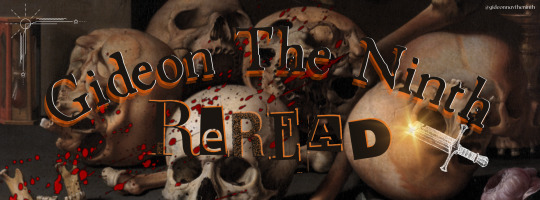
Only the best for the Third House. Strap in, I get real deep in research for the titles on the Third here!!
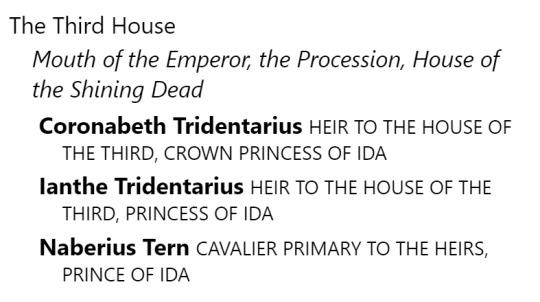
Okay, Mouth of the Emperor has always been interesting to me. It doesn't align as cleanly as the other titles for other houses usually do, but I'd guess it has something to do with either the fact that they're a super gossipy house on the surface level, OR … their cannibalism habit. Now, I'm not saying that this might have to do with John's whole Cannibalizing-The-Earth-To-Achieve-Lyctorhood deal but I'm not NOT saying that. Anyway, "The Procession" is a fun one. This is a REAL symbol heavy one, so keep all your hands and feet inside the ride. First and foremost, this (X) article held my hand through this whole infodump, so read it if you wanna see where I'm drawing my stuff from. So, I googled "The Procession", and was immediately graced with the title "PROCESSIONS, TRINITARIAN" which, putting a word that has to do with the number 3 in the same title as the thing I am researching for the third house is.... pretty good, honestly. Anyway, unlike other houses, the third house is REALLY really into the 3 thing. Like, okay, third house has 3 members show up, cool, not on the nose at all. In the bible, you have the Father, Son, and Holy Spirit, which as far as I'm aware don't really map onto the third house members, but they DO tie into the running theme of three with the Processions. Likewise, "the Holy Spirit is depicted not only as a divine power but also as a divine "person" speaking though the mouths of the apostles" also has to do with the "Mouth of the Emperor" thing (Double Plus, it ties into why the sewn tongue was between a ninth house member, being the house of the sewn tongue, AND a third house member, mouth of the emperor! not to mention the tie between the ninth house is also pretty interesting when you think about how even numerically, nine is three, three times. Just saying) The article also brings up another running trinity theme
triadic formulas that entail both distinction and equality among the three divine persons (e.g., Mt 28:19; 2 Cor 13:13; Eph 2:18; 3:14–17; 4:4–6; 5:18–20; Rom 8:14–17, etc.)
The article generally talks about the theological debate that comes about having your one true god being 3 gods in a trench coat, and what that has to do with monotheism, which I'm sure someone could tie into the locked tomb but I'm looking more into exactly what's up with this whole "Procession" thing, and we have not yet gotten there. We will continue to not get there, because of course, there has to be something else I spot. Of course, it's minor this time. "The Legacy of Augustine, Thomas Aquinas, and Scholastic Theology." Okay, interesting. Augustine isn't even third house, but just a funny detour to have spotted. He always felt more Third house to me than Fifth house, but sure. Augustine pitches an interesting theory. Firstly, "the Lover, the Loved, and the Love" is really interesting and I would love to deep-dive on that, but I really feel like the "mens, intellectus, and voluntas" is the key thing here. I feel like you can map this onto Nona in a lot of ways, and not to get two books ahead of myself but the third is pretty prominent in NTN, just sayiiinggg....
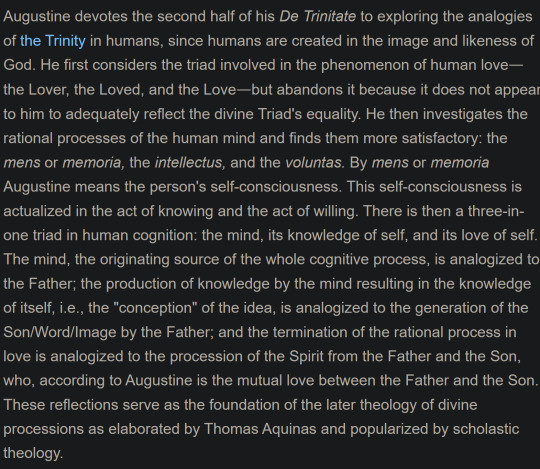
Anyway, here we see something something procession all the way at the bottom. What's up with that, can we see finally what I was supposed to be researching this whole time? well...

I'm killing my brain with paragraphs of religious theory, but generally the procession ties into the concept of origination. It's separated into Transient Procession, a term existing outside what proceeds it (E.g. baker and his cookies) and Immanent (E.g. that story you want to tell that exists only in the confines of your brain). Now this is used to explain that the trinity is just products of the whole, that being the one god. I actually think there's a strong case to be made that this parallels Nona, Alecto, and possibly the Earth. All different states of the same being, in this case. I think you can probably tie in the resurrection beasts into this concept a lot too. We can also stretch this to mean the Third house is, in a way, either representative or tangibly an extension of the Emperor. And, this actually does have some substance when you think about the titles. All of the houses are SOMETHING of the emperors. Tangibly, they're his resurrected planets, but title-wise, they're his Strength, Mouth, Hope & Sword (curious that 4th house gets two and both the ninth house and eight house get none), Heart, Reason, and Joy. Of all of these, Fifth house and Third house are parts of him, his mouth and his heart. We also have the HANDS of the emperor, his lyctors. Everything else is either an emotional piece of the emperor, like his hope or strength, or they serve a physical purpose, being his sword or shield, or in the case of the Eighth and Ninth, both "keepers" (When we get to the Eighth, I'll circle back to this one) So it's possible we could specifically be seeing them as the Transient Extensions of "God" or John, as opposed to his Immanent Processions. Okay, procession other meaning is a lot simpler.

Now, we don't really see the third as a very orderly place, but it's entirely possible that they serve a purpose in order via a ceremonial force. They're probably the most amorphous in their necessity to John. We know he needs soldiers, we know he needs scholars, we know he needs warm bodies for the war, and we know he needs a spot to put his barbie vessel. But what really is the third to him? They aren't the masterminds of the sixth, but they're exceptional at blackmail, and information gathering. In this way, unlike any of the other houses, they're exceptionally skilled at keeping things IN line. This isn't the most conclusive answer, but it's the best I got. I'm sure there's a lot more here, but this is my surface level stuff! help me out here, drop your thoughts!
Crazy to believe we spent that long on just the MIDDLE title, but well, it wouldn't be the third house without an annoying amount of hidden complexity. Not to be outdone, the last title will have to garner it's own post! Still... Still on page 2 of the book. Hopefully the WHOLE reread isn't me writing paragraphs for every 3 words (... unless?)
36 notes
·
View notes
Text
I haven't tried pasting random passages into the bing robot and I haven't seen anyone try it yet so here are my findings
In the 1830s Newman had believed that Catholicism could become what Protestantism had failed to become - a religion for the masses. From that point of view his conversion implied the belief that the Papacy alone could cope with Democracy, and it was the tension he hinted at between the inferential theology of the Church and the simple religion of the masses that made A Grammar of Assent as political a book as The Arians of the Fourth Century.
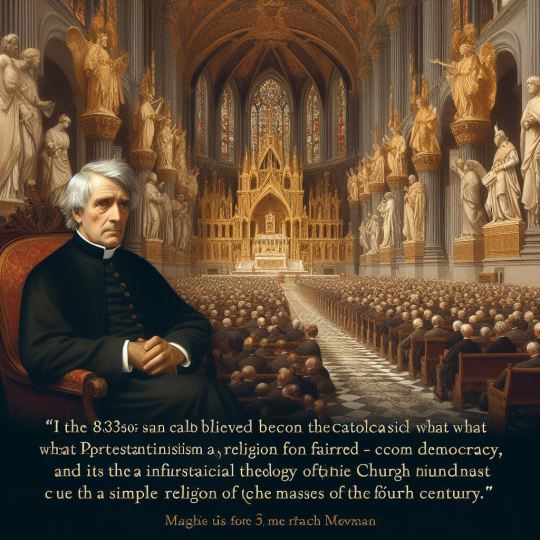
I n the languages investigated so far, relative time reference has been restricted to subordinate verb forms (finite or non-finite), while main clause (and many subordinate clause) verb forms have received absolute time reference. I t should be noted, however, that these correlations are by no means absolute across the languages of the world.

The circumstellar medium of the B[e] supergiants must consist of at least two components: a high-velocity stellar wind and a dense cool region with low velocity, possibly a disk. In the latter, molecules and dust have formed and TiO emission at 6159 A has been observed (see Zickgraf 1993). Significant polarization has been detected in most of the objects (Magalhaes 1993), showing that the envelopes are non-spherically symmetric.
PROMPT BLOCKED
ETS Complexes I, III, IV, and V are all compromised in hybrid copepods, but there are no negative effects on Complex II (Ellison and Burton, 2006). As presented in detail above, Complexes I, III, IV, and V are all composed of interacting mt and N gene products. Complex II is the only complex that is composed entirely of N gene products

In October 1994 I was debating publicly with a conservative scholar in Moody Bible Church in Chicago. I had accepted the invitation in the hope that we could lessen somewhat the mutual contempt between opposing Christian groups. In the event, that did not work since he presented himself as a theological hit man opposing and refuting me as an “atheist” (see how these Christians hate one another).
PROMPT BLOCKED
From the standpoint of logical presentation in the real world, however, we have to carry out a kind of bootstrap operation with regard to the quantity φ; for how could it be known?
Intuitively, you may have no difficulty in seeing the procedure you would use to determine φ from measurements with the counter. But, logically, we need to have the calculation about to be given before we can justify that procedure.

It is not easy to take any of the Hellenistic utopias seriously: they positively invited the unkind attention of a satirist such as Lucian, being “escapist, uncommitted, and gelatinous.”⁹⁷ Behind most of them lurks the ideal of ataraxia, escape from stress: universal brotherhood expressed in terms of fugal myths glorifying the distant and exotic, the Noble Savage as Scyth, Indian, or Hyperborean
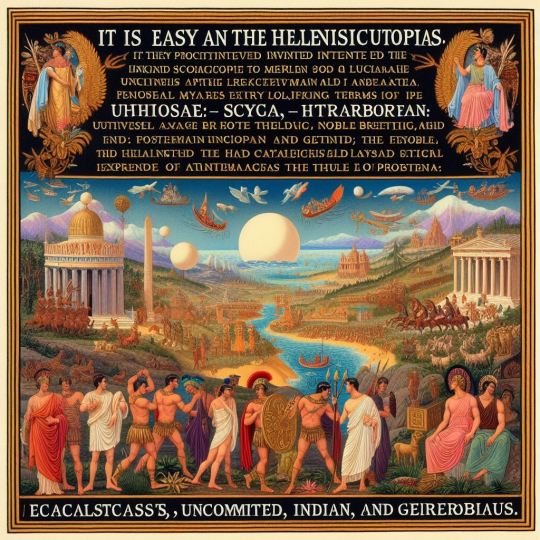
The house was new and on this ground floor smelled of concrete and paint. The rooms were not yet fully decorated; the furnishings were sparse. But there were fans everywhere; and the bathroom fittings, from Germany, were rare and expensive. ‘I am craze for foreign,’ Mrs Mahindra said. ‘Just craze for foreign.’
She marvelled at our suitcases and at what they contained. She fingered with reverence and delight.
‘Craze, just craze for foreign.’

From the outset of this meeting, Smiley had assumed for the main a Buddha-like inscrutability from which neither Tarr’s story nor the rare interjections of Lacon and Guillam could rouse him. He sat leaning back with his short legs bent, head forward, and plump hands linked across his generous stomach. His hooded eyes had closed behind the thick lenses. His only fidget was to polish his glasses on the silk lining of his tie.
Unsafe Image Content Detected
Arryved been° this Cristen folk to londe° In Surrye with a greet solempne route.° And hastifliche° this Sowdan sente his sonde,° First to his mooder and al the regne° aboute,
And seyde his wyf was comen° out of doute° And preyde hire° for to ride agayn° the queene,
The honour of his regne° to susteene.°
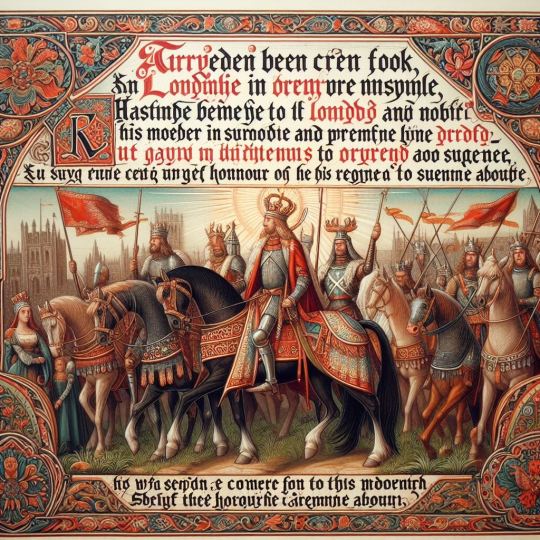
Perturbat me, C. Caesar, etiam illud interdum, quod tamen cum te penitus recognovi, timere desino: re enim iniquum est, sed tua sapientia fit aequissimum: nam dicere apud eum de facinore, contra cuius vitam consilium facinoris inisse arguare, cum per se ipsum consideres, grave est; nemo enim fere est qui sui periculi iudex non sibi se aequiorem quam reo praebeat: sed tua, C. Caesar, praestans singularisque natura hunc mihi metum minuit.
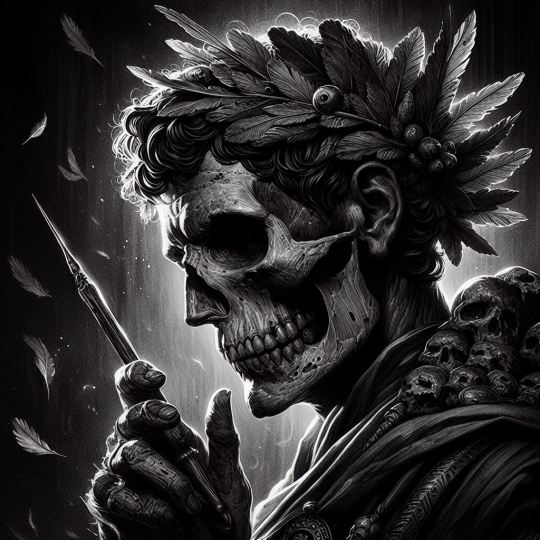
Le jeune homme dont l’œil est brillant, la peau brune,
Le beau corps de vingt ans qui devrait aller nu,
Et qu’eût, le front cerclé de cuivre, sous la lune Adoré, dans la Perse un Génie inconnu,
Content Warning
One week after the parinibbana of the Buddha at the salavana or the Mallas near Kusinara, on the full-moon day in the month of Vaisakha, a monk named Subhadda who took ordination in old age spoke thus, "Friend, you need not lament, you need not grieve. We are free from the Mahasamana who used to trouble us by asking us to perform this or that act."

Excellence, then, is a state concerned with choice, lying in a mean relative to us, this being determined by reason and in the way in which the man of practical wisdom would determine it. Now it is a mean between two vices, that which depends on excess and that which depends on defect; and again it is a mean because the vices respectively fall short of or exceed what is right in both passions and actions, while excellence both finds and chooses that which is intermediate.
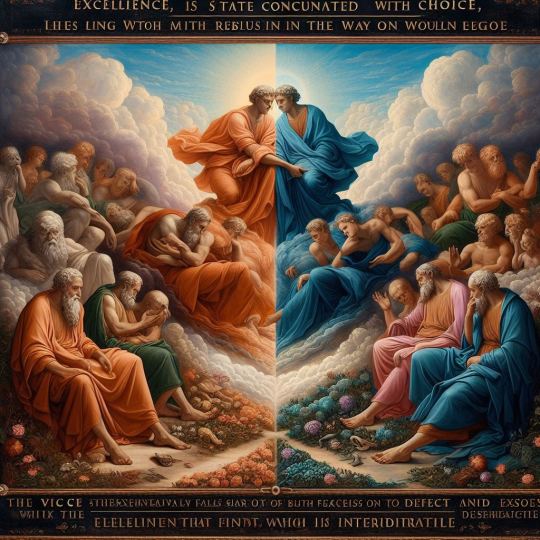
7 notes
·
View notes